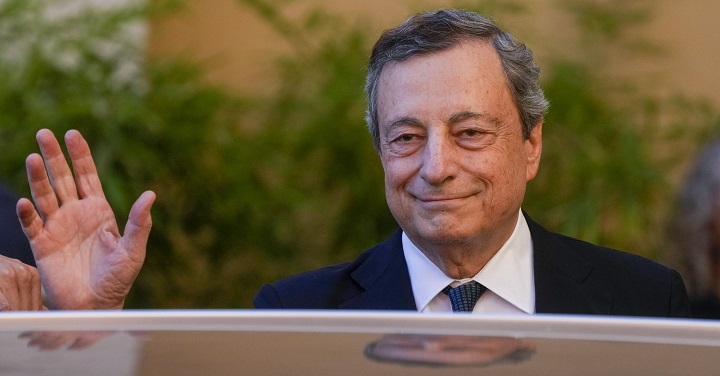
The resignation of Mario Draghi as Prime Minister of Italy, to be officially tendered next Wednesday, could trigger a chain of events going well beyond Italian borders. They could engulf the whole continent and give Russia a badly needed political win, something that so far has escaped it on the battlefields of Ukraine.
One scenario could be the following. On Wednesday, July 20, Day 1, Mario Draghi’s government falls.
On Day 2, after only a few hours actually, the spread between Italian and German bonds starts to rise and soon reaches 600. The stock prices of some major companies are suspended for fear of overselling, as happened in 2011.
On Day 3, actually at the same time as the spread soars, Italy fails to pay interest on its debt and thus the state fails to pay salaries and pensions.
On Day 4, Russian President Vladimir Putin cheers because his primary goal in the Ukrainian invasion—destabilizing Europe—comes true with Italy’s failure.
On Day 5, Poland, Finland, the Baltics, and Romania, which feel all the more threatened by Russia’s success in Italy, go to war against Russia. The conflict becomes pan-European, with many states undecided on what to do.
On Day 6, there is basically a civil war in Italy, and not even law enforcement officers respond to orders.
Is the outlook impossible? No, it is likely. And the one set to gain from it is Putin. Today he cannot win the battle in Ukraine decisively and is trying to open other fronts to relieve the pressure.
From his perspective, the west is extremely weak now. In the UK, Boris Johnson, big on supporting Ukraine, has resigned. In the US, Joseph Biden has the lowest approval rate of any incumbent president since 1950. In France, Emmanuel Macron is being kneecapped by a hostile parliament majority. Germany is in a state of utter confusion. If Italy falls into chaos, many things will go wrong, and Putin can claim victory, despite whatever happens in Kyiv.
There is very little time to defuse this sequence of events, and here we see only three possibilities.
The first is that the crisis started by M5s leader Giuseppe Conte faded. Conte basically says, “I was joking,” and the affair is closed until the parliament expires early next year.
The second is that there is a second Draghi government, without Conte and with a different majority of responsible parliamentarians who want to avoid the country’s descent into chaos. This group rules until the parliament expires.
The third possibility is that a government cannot be formed. Then President Sergio Mattarella would have to ensure two things: that Draghi leads the executive office with certainty until the vote and that the next executive is one of national solidarity. That is, it bars the subversive pro-Putin forces trying to have havoc in Italy.
The realization of the three options is also increasingly difficult because it would occur in a poisonous climate. Conte and his allies are already trying to duck the blame for the mess they are creating, claiming that Draghi wants to resign to shirk his duties.
Indeed, the current government crisis is in the shadow of apparent subversive attempts. In fact, on these very pages we saw the situation before it burst (here).
The Russian government last Friday declared it was hoping not for stability in Italy, but for Rome to distance itself from the U.S., de facto a scare signal to Italians, Ukrainians, and the world, showing off Moscow’s capabilities.
The Italians perhaps need to understand the situation and choose which side they want to be on.
On the other hand, with this, an attempted postmodern coup, Putin has raised the level of confrontation and changed the game’s rules. The margins for compromise in Ukraine have thinned.
The stakes then become ending the war in Ukraine as soon as possible by any means, to avoid widening the conflict into Western Europe. Or it will be fought not only on the banks of the Dnieper but also on those of the Tiber.
Finally, China is closely following the evolution of events in Ukraine and Europe. Indeed, a Russian success in Rome could embolden Beijing’s hard-liners, with risky fallout in Asia and the rest of the world.





